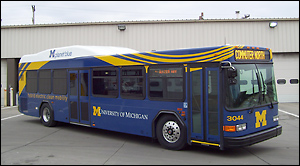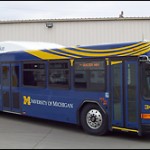
 The U-M Ann Arbor campus debuted its first diesel-electric hybrid bus this week.
The U-M Ann Arbor campus debuted its first diesel-electric hybrid bus this week.
Sporting a maize-and-blue color scheme and new graphic treatment, the 40-foot buses use a roof-mounted battery system to supplement their diesel engines, allowing for better fuel mileage and lower emissions. Officials expect an improvement of 30 percent over a conventional bus.
“The addition of hybrid buses to our fleet is another step in our commitment to sustainability,” says Keith Johnson, associate director of transportation operations. “By the end of 2012, one in six buses on campus will be a hybrid.”
Three additional buses will be operational in the fleet by mid-January and three more will be in service this fall. The new buses will begin replacing current buses that run on diesel fuel.
Hybrid technology is especially beneficial for vehicles that encounter frequent stop-and-go traffic, like campus buses. When the brakes are applied, a generator converts the energy released from deceleration into electrical energy, which is stored in a battery and used when the bus accelerates.
In addition to the new buses, the university has purchased an additional 30 hybrid sedans. The sedans are available to faculty, staff and students for authorized university business travel, both local and long distance.
The university received federal funding to help cover the additional cost of a hybrid over a conventional vehicle.
The university operates one of the largest alternative-energy vehicle fleets among universities in the United States, with 545 vehicles running on E-85 fuel, 96 vehicles using bio-diesel, 55 hybrid sedans, and 15 all-electric vehicles. Renewable energy sources comprise 16 percent of the total transportation energy at U-M .
The university’s long-term goal for its fleet is to continue to evaluate the number of vehicles needed in the fleet and, when those vehicles are due to be replaced, Parking & Transportation Services will consider alternative energy or the most fuel-efficient vehicles possible for the vehicle application.



